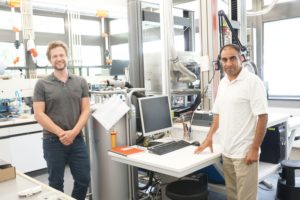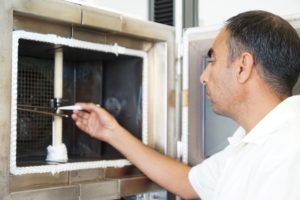Professor Ali Hussain
Georg Forster Research Fellowship

Introduction:
My name is Ali Hussain. I am an Associate Professor at Institute of Space Technology, Islamabad, Pakistan. Currently, I am conducting research on high energy density solid state materials for energy storage applications at the Department Materials Science and Engineering, Institute of Glass and Ceramics, Friedrich-Alexander-Universität Erlangen-Nürnberg.
Why choose FAU:

FAU is a worldwide well-known German University, famous for its innovative research and diversity. Prof. Dr. Kyle Webber is one the leading scientist working the field of my research interest with a significantly strong academic and research profile. He is Professor of Materials Science and Engineering and Head of the Institute of Glass and Ceramics. He has big research group including researchers not only from Europe but also from Asia, America and Africa. His department has all research facilities need for the development and characterization of advanced materials.
Fellowship:
My research stay is supported by Alexander von Humboldt Foundation through a fellowship, which is one of the most prestigious fellowships in the world. The AvH awards are highly competitive and attract exceptionally qualified scientist from all over the world, irrespective of gender and country quota. The worth of AvH fellowship is evident from the fact that so far fifty-seven Humboldtians have been able to win the Nobel Prize (the most recent one in October 2021). The AvH foundation selection criteria not only depends on the academic and research profile of the applicant but also on the profile host scientist and his university.
Focus of Research visit:
Regarding my research, I am working to develop environmentally friendly lead-free anti-ferroelectric ceramics for high energy density capacitors. AS is well-known, the production, distribution, and storage of energy is one of the most critical issue of our time, requiring various scientific and engineering solutions. Among the presently available electrical energy storage devices, the dielectric capacitors offer the advantages of fast charge–discharge capability and high-power density. Although, they have inferior energy density in comparison with batteries, their power density is exceptional and interesting for pulsed power applications. Nevertheless, efforts are going on to further improve their energy storage performance and decrease the overall volume and weight of the power electronic devices.

In this project, we have proposed to develop lead-free anti-ferroelectric NaNbO3 based ceramics through compositional design, i.e., substitution of isovalent Ta on B-site and aliovalent Sm substitution on A-site of NaNbO3, and tailoring the microstructure of the optimized composition through texture engineering, employing reactive template grain growth method utilizing NN template produced by a topochemical microcrystal conversion process. It is expected that the novel design will circumvent the drawbacks of the conventionally synthesized NN ceramics delivering a high efficiency η (above 80%) for the textured NN-based ceramic system.
Further information
Prof. Dr. Kyle G. Webber